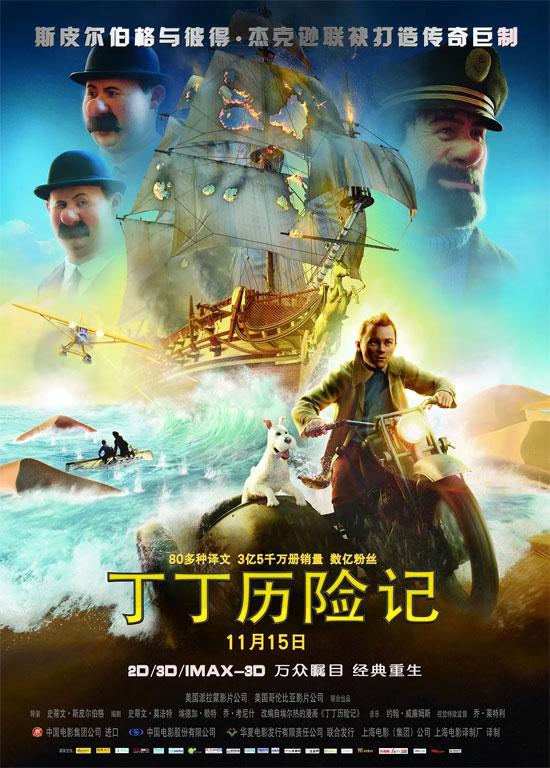Film Name: 丁丁历险记 / The Adventures of Tintin: The Secret of the Unicorn

I believe those who have seen this film once and those who have seen it twice will not share the same feelings about it. Similarly, those who have read the original “The Adventures of Tintin: The Secret of the Unicorn” comic and those who haven’t will also have different impressions. This is a film that can be viewed as a standard Hollywood blockbuster, yet it is also a film unlike any other Hollywood animated blockbuster that has come before. Your experience of it can stem from the film’s inherent elements—its gimmicks, plot devices, thrilling chases, rich cinematography, and clever montage editing—but it can also come from something simpler: the unique and deep affection you hold for the name “Tintin” itself.
Watching “The Adventures of Tintin: The Secret of the Unicorn” felt like embarking on a journey that traces a river from its source. It begins as a gentle stream, yet by the end, it swells into a mighty current, surging into the ocean. As a reporter, Tintin consistently accomplishes detective work. Starting from a bizarre incident encountered by chance, he unravels mysteries layer by layer like solving puzzles, ultimately uncovering jaw-dropping truths. On one hand, the stories are wildly imaginative. The clever and courageous Tintin always manages to overcome difficulties with ingenuity, lending his texts a fantastical quality. On the other hand, the quest for truth unveils diverse cultures and customs, intertwined with political and historical contexts, lending the narrative profound historical realism. The true value of The Adventures of Tintin: The Secret of the Unicorn lies precisely in this fusion of rich fantasy and deep realism.
What I most appreciate in the film isn’t the seemingly thrilling chase sequences. In Hollywood blockbusters, such chases have become formulaic tropes. Though The Adventures of Tintin: The Secret of the Unicorn masterfully blends humor and suspense in these scenes, I still view them as merely material-level elements. What I truly admire is how the film continuously transports you to new countries, new settings, and new environments, allowing you to journey across half the globe alongside Tintin. From the Montmartre heights of France to Morocco, from oceans to deserts, from ocean liners to airplanes—the film’s seamless transitions between settings and modes of transport evoke a sense of transcending time, space, and obstacles. This very act of crossing boundaries embodies the way Tintin pursues his life’s purpose.
The essence of Tintin’s adventures lies not in the dangers he faces, but in his decision to embark on them. The essence of Tintin’s legend lies not in the treasures he acquires from his adventures, but in the lifestyles he seeks to experience. In the film, he and Captain Haddock encourage each other through moments of doubt. Whenever one falters, the other steps forward to remind them of the importance of perseverance. This mutual support forms the core of their bond as each becomes the other’s most vital partner in life.
Every person possesses three attributes: professional, familial, and social. Professional attributes refer to the occupation one pursues and the demands it places on an individual. Familial attributes describe the role one plays within the family—as a father, husband, or son. Social attributes denote one’s standing in society—whether as an ordinary citizen or a public figure, someone who contributes value to society or someone who causes harm.
Tintin’s professional identity is that of a journalist, though perhaps he is more accurately an explorer. Ultimately, whether he publishes his reports matters little; people don’t interact with his news articles or the media outlet he represents—they interact with him as an individual. Dingding’s familial attribute is that of a single man—no parents to care for, no children to raise, no wife, not even a girlfriend. This setup may be designed to allow him greater dedication to adventure, yet the absence of family ties robs the character of certain emotional depth. His social attribute positions him as a moderately well-known contributor to society. His ability to maintain good relations with law enforcement indicates a certain social standing, while his intelligence enables him to assist those around him.
Wrapped in these three defining attributes, does Tintin ultimately feel like a real person or a fantasy? Personally, compared to characters like the Dupont brothers or Haddock—who feel very grounded in reality—Tintin strikes me more like a transparent figure, someone who doesn’t truly exist. He is a figure conceived by Hergé to embody everyone’s desire for adventure—a spokesperson with flawlessly righteous character and comprehensive abilities, who comes and goes swiftly, leaving no trace behind. He merely savors the joy of adventure and the pursuit of truth. He serves as a prop for Tintin’s companions like Haddock, for the author Hergé, or even for you and me—a tool to realize dreams and seek genuine knowledge.
Finally, a note on the motion capture technology used in “The Adventures of Tintin: The Secret of the Unicorn.” While reports suggest motion capture was Spielberg’s ultimate effort to translate Tintin’s story through cinematic means, I don’t believe it’s the best approach for presenting Tintin. Hergé’s comic “The Adventures of Tintin: The Secret of the Unicorn” epitomizes minimalist style, where abstraction and simplicity are crucial elements. Motion capture, however, delivers an extreme realism in its visual presentation. This level of complexity and realism actually runs completely counter to the comic’s artistic style. Of course, this doesn’t detract from the film’s flawless execution of the motion capture technology itself.
Please specify:Anime Phone Cases » The Adventures of Tintin: The Secret of the Unicorn 2011 Animation Film Review: Actually, Tintin is just a prop.